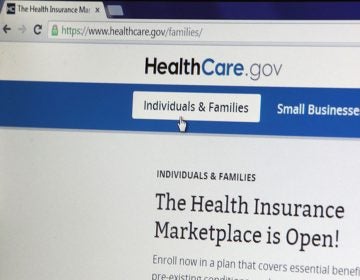Can Republicans give Americans with disabilities the health insurance reform they need?

President Donald Trump departs after speaking during an event about healthcare in the Blue Room of the White House, Monday, July 24, 2017, in Washington. (AP Photo/Alex Brandon)
Insurance coverage for health care in America needs reform, especially for those on Medicaid. With the American Health Care Act (AHCA) dead in its tracks and the threat of all out repeal without a viable replacement, advocates should push for positive reform and improvements to public plans, now more than ever.
My family is currently on Medicaid, and because of a physical disability that I have had since birth, my family and I have had to rely on public and nonprofit medical programs much of my life. The condition, congenital talipes equinovarus, or “club foot,” is a common hereditary deformity. By the time I was six years old I’d had at least three major surgeries to reshape my feet and lower legs. Much of the time I lived at Shriner’s Hospital for Children, a nonprofit that performs necessary operations on children whose families cannot otherwise afford it.
Some of my childhood memories from living in an institution for the disabled are happy: being able to very comfortably wheel myself through the areas to which we were confined, and not feeling constantly judged. Later I realized there were two reasons we were all in the hospital together. One was that we truly needed extensive care that our families were not able to get in any other way. The second was that the world was not able to handle us. When I was a child, there were not yet any laws guaranteeing equal access for disabled people. Now the Americans with Disabilities Act, signed in 1990, “guarantees that people with disabilities have the same opportunities as everyone else to participate in the mainstream of American life — to enjoy employment opportunities, to purchase goods and services, and to participate in state and local government programs and services.”
Even though I can walk now, I think constantly about accessibility. Taking a train to work, I think about people in wheelchairs who have access to only certain train stops, and that is considered “equal.” Buildings that have separate hidden entrances in alleyways for those who have difficulty navigating steps is considered “equal.”
Not one of these is an example of equal access.
In a similar way, health care in the United States is considered equally accessible. However, with current regulations to insurance, even with small increases in income requirements through the public options offered by the ACA, the differently abled are forced to live in extreme poverty to have access to the health care we require daily. And we are sometimes called “ungrateful” people who barely contribute to society if we dare to say we want something better.
Medicaid is not a gift, it involves work.
I now have my own children, one of whom has autism. In order for my son, myself, for anyone to receive Medicaid there are many requirements. Unlike the relatively easy online ACA form, people on Medicaid through public programs such as Social Security must report income every month. This is on top of the extensive documentation the government requires to prove a disability. There are ongoing meetings and documentation, and constant embarrassing scrutiny of everything you have, causing elevated levels of stress, while you read about government bailouts of banks and taxpayer money covering meal expenses for wealthy government officials.
There are two kinds of Social Security programs for those with disabilities: Supplemental Security Income (SSI) and Social Security Disability Insurance (SSDI). I consulted my childhood friend and legal representative Jonathan Sweeney to explain the difference in access. Sweeney is licensed to practice Social Security Disability Law in Pennsylvania and New Jersey.
To qualify for Medicaid through SSI, one need only qualify for SSI disability payments, he explained. “Medicaid insurance is immediately available to SSI recipients,” he said. “The immediate eligibility is an important distinction in this case. For those receiving SSDI, the insurance available is Medicare and there is a two-year waiting period, from the first date of eligibility of disability payments, before a recipient will qualify for Medicare.”
SSDI is available to those who have worked and paid into the system through taxes, and SSI is for disabled people who have not had much, if any, work history.
“While SSDI is not means tested, SSI and Medicaid are means tested,” Sweeney said, “and have identical asset/income limitations. It does not take much to disqualify a potential recipient, or terminate benefits of a current recipient.”
The current asset limitation is $2,000 for a single individual and $3,000 for a household of two. Just about every kind of asset is considered in determination for SSI: the cash you have in your pocket, the value of your automobile above $4,500, jewelry other than wedding rings, life insurance policies over $1,500. These limitations keep people with disabilities in extreme poverty.
Imagine not being able to ever have more than $2,000 saved at any given time. Imagine being constantly worried about your checking account having close to $2,000. I have been at appointments where families are refused services and told to sell of all of their assets and spend all of their money before reapplying for benefits — benefits that are taken out of your taxes, from a job you work twice as hard to maintain because you struggle with daily illness and get very little paid time off (often none), and where you may be lucky to make $10 an hour.
It is impossible to save money to move. You fear accepting higher-paying jobs, as you could lose your health insurance and be forced to purchase health insurance you cannot afford for care that can be less adequate and require additional co-payments for doctors’ visits and medications on top of monthly premiums. That is assuming you will even be able to purchase health insurance if the ACA is repealed — because many insurance companies prior to the ACA did not cover various disabilities, including autism in children, even though 1 in 100 children is diagnosed with autism in America.
I live in that world every day.
“Technically, a recipient of SSDI or SSI can work,” Sweeney said. “I use the word ‘technically’ because disability benefits are typically premised on one’s ability to engage in regular work that is substantially gainful, for non-blind adults.’ Substantially gainful’ is $1,170 a month before taxes.”
“Perhaps one of the most difficult things for my clients to wrap their head around is that a finding of disability is almost always a question of capability: What are you physically and mentally capable of doing, despite your limitations? Rarely are benefits awarded on diagnosis alone,” Sweeney said.
A person with even a very clear disability, like the one I had as a child requiring a wheelchair and being unable to walk, does not automatically grant you access to Medicaid.
In a June 23 op-ed by U.S. Sen. Pat Toomey, he wrote, “Perhaps most important, for the first time in history, the Medicaid program will be reformed so it is sustainable for future generations and for taxpayers.”
However, with SSI, SSDI, and Medicaid keeping people in extreme poverty to receive benefits, we need reform now.
Even Republicans recognized that the AHCA was not a real option for reform.
The Kaiser Family Foundation estimates that over 10 million Americans in poverty were added to the Medicaid program through the ACA. With the continued requirement that those receiving Medicaid, even through the ACA, remain in extreme poverty, unable to have even a few thousand dollars to their name, how can those people move out of the government system and into a position to afford to purchase their own insurance? If repeal is enacted without a viable replacement option, what are tens of millions of Americans expected to do about insurance and receiving health care until Representatives can figure out a replacement
Medicaid expansion allows differently abled people, like my son, to live at home instead of an institution, as I was forced to for portions of my childhood. Not only is living in a community better for people with disabilities, it is a better option for the government financially. The National Council on Disabilities says that, according to the most recent data, the “average annual expenditure for state institutions was $188,318, compared to an average of $42,486 for Medicaid-funded home and community-based services.”
Before becoming a politician, Toomey worked at places like Chemical Bank and Morgan, Grenfell & Co., where he primarily dealt in currency. As a businessman he should know that imposing oppressive financial gains restrictions on people does not only limit those people, it limits the ability of their communities, cities, states, and country to grow. Real reform to the insurance system through the Congressional Budget Office needs to include supports for the most vulnerable and plans for those of many abilities to gradually move out of extreme poverty without endangering their health. That is the real reform that health insurance in the United States needs.
WHYY is your source for fact-based, in-depth journalism and information. As a nonprofit organization, we rely on financial support from readers like you. Please give today.



